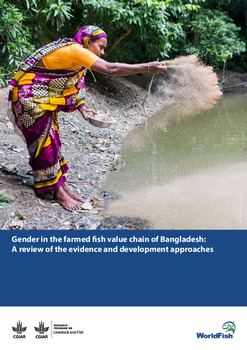Gender in the farmed fish value chain of Bangladesh: A review of the evidence and development approaches

Citation
Kruijssen, F. et al. (2016). Gender in the farmed fish value chain of Bangladesh: A review of the evidence and development approaches. Penang, Malaysia: WorldFish. Program Brief: 2016-38
Bangladesh is the world's fifth-largest aquaculture producer, and statistics indicate that aquaculture now makes up about 56% of the country's total fish production in terms of value. In Bangladesh, fish is the most important food after rice. Bangladesh is considered a patriarchal society, and its predominant gender norms and attitudes reinforce women's roles as primarily limited to domestic and care duties, which take place mainly within the confines of the homestead. This means they are unable to generate the same incomes and other benefits, and have limited incentives to invest time and resources to improve their position. To better appreciate the situation, it is important to understand the underlying social and gender norms that determine what women and men can and should do if the aim is to engage women, in particular, as more effective value chain actors. This brief is based on a review of the relevant literature, focusing on analyzing gender relations in fish farming and value chains, i.e. the roles women and men play in diverse aquaculture production systems and other value chain nodes, their relative access to and control over resources, intrahousehold decision-making, and social and gender norms and attitudes.
Permalink
Date Available
Type
Publisher
Countries
Copyright
CC BY 4.0
Research Themes